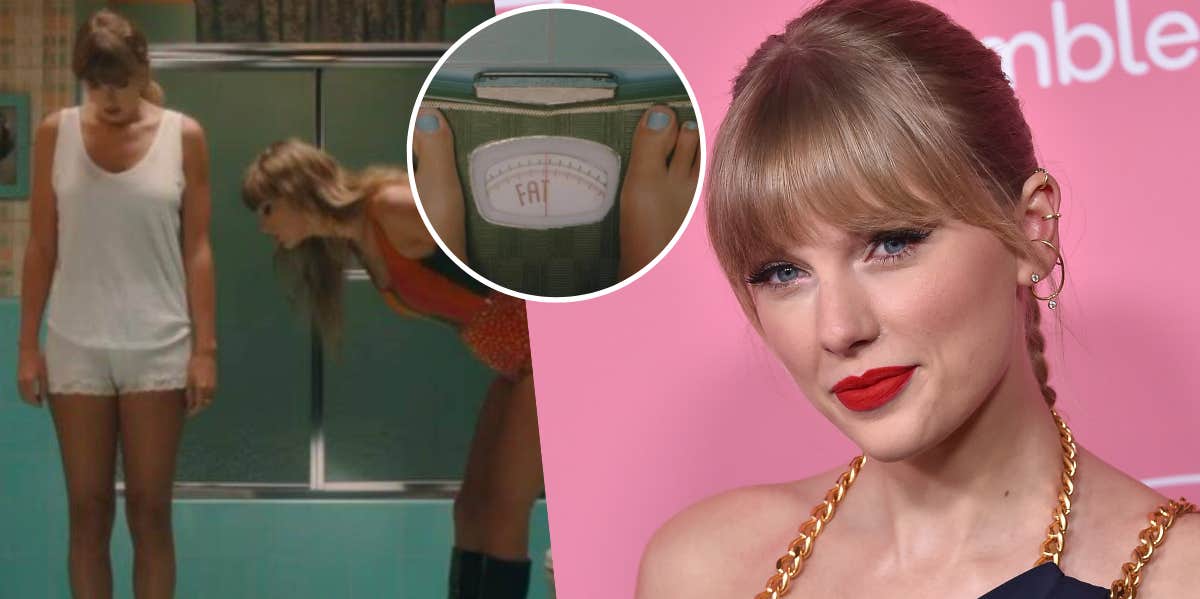
People are split on Twitter
By Victoria Soliz — Written on Oct 24, 2022
Photo: YouTube / DFree / Shutterstock

After Taylor Swift debuted the music video for her new song "Anti-Hero," fans were divided over whether a scene in the video is fatphobic.
Swift’s new highly anticipated album "Midnights" has been met with fans and critics alike raving about the concepts and lyrical content of the album.
In just the first day of its release, Swift’s loyal fans helped her break two Spotify records of becoming the most streamed album and artist in a single day.
Upon releasing the album (as well as her 3 AM surprise seven tracks), Swift also released her first music video for one of the singles ‘Anti-Hero.’
The song takes us through Swift’s biggest fears and insecurities.
It seems one of the depictions of these insecurities didn’t bode well with fans.
RELATED: A Complete Breakdown Of Who Taylor Swift's Songs Are (Allegedly) About
Taylor Swift is being accused of being fatphobic in her 'Anti-Hero' music video.
In the video, Swift steps onto a scale with her darker alter ego (the personification of her insecurities) looking disapprovingly while the scale tips to a message saying ‘fat.’
People were quick to go onto Twitter to call the singer out for this message.
“T@ylor was just expressing her own insecurities.”
Yes! We love vulnerability! But a wealthy, thin white woman made a decision to capitalize on fatphobia by vocalizing publicly that her greatest fear and insecurity is being what some people ARE: fat.— The Madwoman in the Classroom (@heymrsbond) October 22, 2022
“A wealthy, thin white woman made a decision to capitalize on fatphobia by vocalizing publicly that her greatest fear and insecurity is being what some ARE: fat,” one user wrote.
The general opinion appeared to be that Swift, as a thin woman, was framing fatness as a fear which upset those who embrace fatness as their reality.
Another controversial tweet read, “There’s something so angering about a very thin woman posting this to likely reference her disordered eating. Idc if it was just TS ‘worst nightmares’ or her ‘intrusive thoughts’, it’s fatphobic and was at best deeply unnecessary to have in the f–king video.”
RELATED: Taylor Swift Is Not Understanding Why We're Mad About Her Private Jet
TW // ED mention
There’s something so angering about a very thin woman posting this to likely reference her disordered eating. Idc if it was just TS’ ‘worst nightmares’ or her ‘intrusive thoughts’, it’s fatphobic and was at best deeply unnecessary to have in the fucking video. pic.twitter.com/mwDEgkrJdD— Leah(@hutchleah) October 21, 2022
Fans of Swift quickly came to her defense underneath the tweet.
“This is a bad take. Thin people have eating disorders and mental health crises and this is perfectly valid. Society is fatphobic and tells healthy people that every gram is too much and that f–ks people up. Let them talk about their experiences for gods sake!” one user wrote.
Fans argued that Swift is not shaming fatness but rather highlighting how society makes women fear weight gain.
“Part of healing from fatphobia culture is being honest about its impacts," another user wrote.
"For most of us, we have been taught that being fat is morally wrong (which it isn’t) and she’s being honest about her past fears. Give her time to address it but I disagree it’s inherently fatphobic."
Swift has alluded to her own negative relationship with her body and her struggle to embrace her image in the past and hinted that "Anti-Hero" would touch on that theme.
When promoting the album’s release, Swift took to her Instagram account to talk about the song’s meaning.
“I struggle a lot with the idea that my life has become unmanageably sized and that I struggle with the idea of not feeling like a person," she told fans.
"This song is a guided tour throughout all the things I tend to hate about myself and it’s all of those aspects of the things we dislike about ourselves that we have to come to terms with if we’re going to be this person."
Swift has previously opened up about her struggles with her eating disorder in a 2020 interview with Variety.
Related Stories From YourTango:
“I didn’t know if I was going to feel comfortable with talking about body image and talking about the stuff I’ve gone through in terms of how unhealthy that’s been for me — my relationship with food and all that over the years," she stated.
Swift declined to go into debt, admitting that she wasn't yet ready to articulate her thoughts, but hinted that she had been influenced by a culture that penalized weight gain.
"My relationship with food was exactly the same psychology that I applied to everything else in my life: If I was given a pat on the head, I registered that as good. If I was given a punishment, I registered that as bad,” she said.
Swift's own experience would suggest that, as someone who has battled with her own self-image, she has authority to probe fatphobia in her music video.
But, the concerns of those who feel attacked by her critique are valid too.
Swift has yet to comment on the discourse surrounding her video.
If you or someone you know is struggling with an eating disorder, please visit NEDA for resources.
Victoria Soliz is a writer with YourTango who covers news and entertainment content. Her work explores pop culture trends, film and TV, and celebrity news
